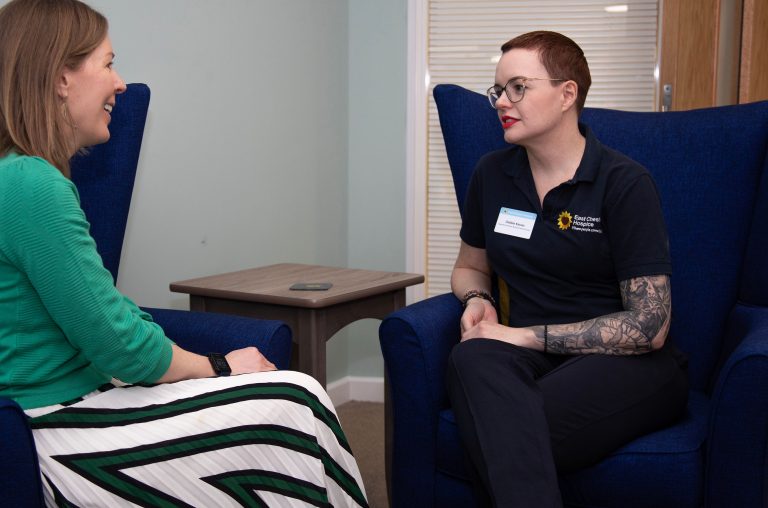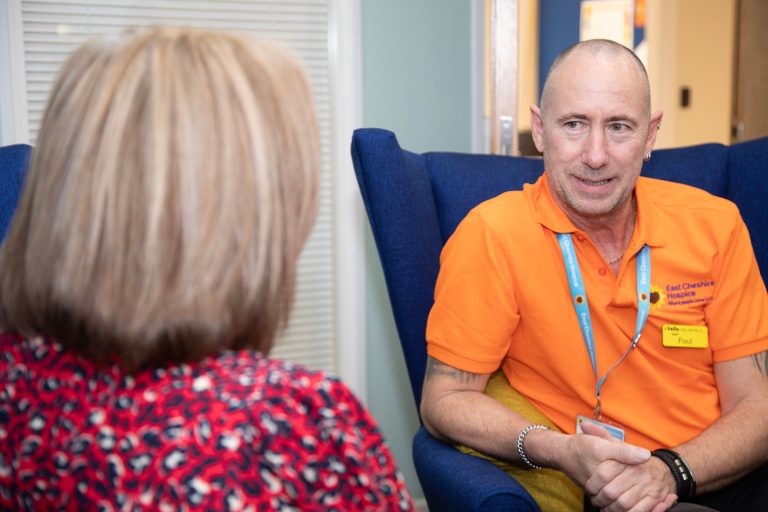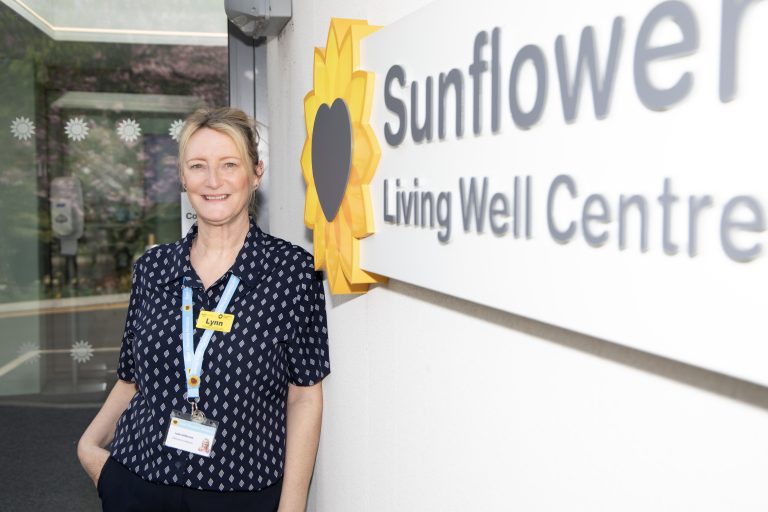Home / Our Care / Patients & Families / Sunflower Living Well Centre / Dementia Support
We are proud to offer a huge variety of different services to families experiencing dementia in our local community.
If you, or someone you know is eligible (see below criteria) and would like to receive dementia support from East Cheshire Hospice, please fill out the online Dementia Services referral form below, or call 01625 666 990.
Explore the range of dementia support we offer below:

Our Dementia Carer Wellbeing Programme has been running successfully since 2015 and is a structured eight-week wellbeing and support programme open to family carers of people experiencing dementia. What is unique about our programme is that the carer can bring the person experiencing dementia with them and they will receive our Cognitive Stimulation Therapy Programme for up to 16 weeks. The programme currently runs 3 times a year in January, May and September in Macclesfield, Knutsford, Poynton, Wilmslow and Congleton.
Increased confidence, knowledge, skills, developing resilience, enhancing current coping strategies, developing new ones, sharing experiences, having some respite and gaining peer support from others in similar circumstances.
Please complete our online dementia referral form, or download the dementia referral form document (available at the bottom of the page) and send to the details on the form, or call us on 01625 666 990.
We offer a number of ways to help you plan ahead, including:
A dedicated session within our Carers’ Wellbeing Programme, focusing on future planning and care options.
Our End Stages of Dementia carers’ talk, held several times a year, which helps families understand when someone may be approaching their final year of life.
One-to-one support with a dementia nurse to explore advance care planning.
To access any of these services, please call us on 01625 666 990.
Our Patient Social Support Group offers caregivers a well-deserved break. Running once a week for eight weeks, each two-hour session provides a safe and stimulating environment for the person with dementia, while their caregiver takes time for themselves. During the sessions, participants enjoy cognitively stimulating activities led by our trained staff and volunteers.
The programme currently runs three times a year – in March, July, and November – and is available in Macclesfield, Knutsford, Poynton, Wilmslow, and Congleton.
Increased confidence, knowledge, skills, developing resilience, enhancing current coping strategies, developing new ones, sharing experiences, having some respite and gaining peer support from others in similar circumstances.
Please complete our online dementia referral form, or download the dementia referral form document (available at the bottom of the page) and send to the details on the form, or call us on 01625 666 990.
Love to Move is like brain gymnastics. It’s specially designed to get older people moving and functioning better. The programme achieves this by carefully integrating the use of gymnastic foundation skills, cognitive stimulation therapy and social interaction activities. Almost every part of Love to Move is based on bilaterally asymmetrical movement patterns. This is understood to benefit older people and those with dementia and mild cognitive impairment, by enabling the left side and right side of the brain to process information independently; thus, improving cognitive function, coordination, and the ability to carry out activities of daily living more independently.
It is aimed at older people from 55 +. Love to Move particularly benefits older people to improve communication, mobility, building stamina and increasing wellbeing.
If you’d like to chat about the service or ask any questions, feel free to call us on 01625 666 990.
Otherwise, here are the details:
Knutsford Methodist Church, Princess Street, WA16 6BY
Wilmslow United Reformed Church, Chapel Lane, SK9 1PR
East Cheshire Hospice, Millbank Drive, SK10 3DR
Poynton Civic Hall, Park Lane, SK12 1RB
Astbury Village Hall, Peel Lane, Astbury, Congleton, CW12 4RQ
Our singing group involves singing to music with light movement. Singing is an effective non-pharmacological intervention for individuals experiencing dementia. Research shows singing can elicit significant emotional and cognitive responses, helping to improve mood and reduce feelings of anxiety and depression often associated with the condition. Various studies suggest that music, especially familiar songs from an individual’s past, can stimulate memories and enhance communication abilities, even in the later stages of dementia. For instance, participation in group singing activities fosters social interaction, reducing feelings of isolation and loneliness that many dementia patients experience.
Helps to improve brain activity through the use of signing, music, movement and can enhance brain function, increase attention span, and improve overall quality of life
If you’d like to discuss the service or ask any questions, please don’t hesitate to call us on 01625 666 990.
Otherwise, you can find the locations, dates and times of our sessions below:
Knutsford Methodist Church, Princess Street, WA16 6BY
Wilmslow United Reformed Church, Chapel Lane, SK9 1PR
East Cheshire Hospice, Millbank Drive, SK10 3DR
3rd Wednesday of each month
Poynton Civic Hall, Park Lane, SK12 1RB
Astbury Village Hall, Peel Lane, Congleton, CW12 4RQ
Our social club involves live entertainment and refreshments. People sing if they want, they dance if they want and mix and chat with staff and peers. It is a lot of fun and a good way to boost your own wellbeing. Regular social interaction helps to reduce feelings of loneliness and isolation and can lead to meaningful friendships and connections.
Benefits of attending the Sunshine Social Club extend beyond mere socialisation; they contribute to personal development, emotional health, and a vibrant, fulfilling life. We offer live entertainment chance to dance, sing and socialise as you wish as well as chance to chat with our dementia team staff.
If you’d like to chat about the service or ask any questions, feel free to call us on 01625 666 990.
Otherwise, here are the details:
Connect with others facing similar experiences at our dementia café. Enjoy a warm, supportive environment where you can share stories, find resources, and participate in engaging activities. Whether you’re living with dementia or caring for someone who is, you’ll find friendship and understanding here. Join us for a cup of coffee and a sense of community.
If you’d like to chat about the service or ask any questions, feel free to call us on 01625 666 990.
Otherwise, here are the details:
Wilmslow United Reform Church, Chapel Lane, SK9 1PR
Poynton Civic Hall, Park Lane, SK12 1RB
Astbury Village Hall, Peel Lane, Astbury, Congleton CW12 4RQ
Knutsford Methodist Church, Princess Street, WA16 6BY
East Cheshire Hospice, Millbank Drive, SK10 3DR

Some of our dementia services are available by referral, while others are open as drop-in sessions (please see the service details above for more information).
Referrals can be made by healthcare professionals such as your GP, or you can refer yourself using the online dementia services referral form linked below, or by downloading and completing the referral form at the bottom of this page.
East Cheshire Hospice is committed to improving the lives of local people affected by dementia, including both those living with the condition and their carers.
As part of our five-year strategy, we are focused on expanding and enhancing our dementia support. This includes increasing the reach and effectiveness of our existing services, introducing new initiatives, and strengthening the overall dementia-friendliness of our organisation.

Thank you so much for choosing to support East Cheshire Hospice. You may never know how much your gift means, but we know that it will make the world of difference to our patients and their families.